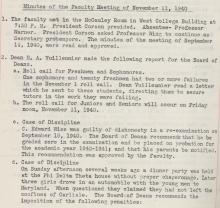Plans for a Women's Dorm Needed ASAP!
Dean Ernest A. Vuilleumier reports to the Board of Trustees that the college was operating four separate buildings--Metzger Hall, the Gibbs House, the Parker House, and the Phi Delta Theta House--as women's dormitories. The dean viewed this situation as unsatisfactory and argued for "the very great need for a new dormitory for women." He urged the Board to make plans for the construction of a women's dormitory as soon as possible.



